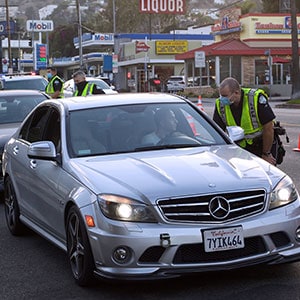
As a Maine defense attorney, one of the most common reasons people contact my office is due to a traffic stop. While many people believe that traffic violations are pretty minor, they can lead to serious consequences, such as fines, license suspensions, and even criminal charges. Understanding Maine’s traffic stop laws is critical if you have been cited for a traffic violation.
First, it’s important to understand that in Maine, police officers can stop you for a traffic violation or for suspicion of a criminal offense. When you are pulled over, the officer will typically ask to see your license and registration, as well as proof of insurance. You are also obligated to provide the officer with this documentation.
You may be wondering what your rights are during a traffic stop in Maine. It’s important to remember that you have the right to remain silent during a traffic stop and that you do not need to answer any questions. You also do not need to consent to field sobriety tests or a search of your motor vehicle. As stated above, you are required to provide your license, proof of insurance and vehicle registration. If you do choose to make statements, you should not knowingly provide false information as that can result in criminal charges. It is important to remember that our justice system is rooted in judicial review after-the-fact. I occasionally joke that the Constitution is not a self-help document. What I mean by this is that your Constitutional Rights protect you from government overreach in the Courts. They do not protect you in real time confrontations with law enforcement officers. This means that if you are detained, protect your rights but making it clear that you do not consent to a search and that you intend to remain silent but do not actively resist law enforcement in any way. If you are ordered out of a vehicle, you should comply. If the Officer states that he is searching your vehicle, do not attempt to prevent him doing so. If the Officer states that you are under arrest, do you not physically resist in any way. If you were illegally stopped or detained, a defense attorney will be able to argue that in Court. If your car was illegally searched, a defense attorney will be able to argue that in Court. If you were illegally arrested, a defense attorney will be able to argue that in Court. But if you physically resist law enforcement, you could create new charges and new legal problems for yourself that will only hurt your case.
One of the most important things to remember during a traffic stop is to be respectful and calm. Being belligerent or combative can only make things worse for you. Being courteous to an officer during a traffic stop is never going to hurt your situation. Officers are given wide discretion in issuing traffic citations and being polite and respectful could be the difference between a ticket and a warning.
If you are issued a traffic violation, it’s important to take action right away. Ignoring a citation or failing to pay a fine can lead to more severe consequences, such as suspension of your driver’s license or even a warrant for your arrest.
A skilled defense attorney can assist you with the navigation of the traffic system, explore possible defenses to the charges filed against you, negotiate with the prosecution, and work towards minimizing the potential consequences of a committed offense.
Overall, navigating the traffic laws in Maine can be complex and confusing. By working with an experienced attorney, you can ensure that you understand your rights and options and take the necessary steps to protect yourself and your interests.
William Ashe is an experienced trial attorney with a career track record of determined
effective representation and consistent sustained success on behalf of his clients. He has
been named to the National Trial Lawyers Top 100 Criminal Defense Attorneys every year
since 2014 and has a perfect 10.0 rating by the lawyer rating site Avvo. (207) 813-2935